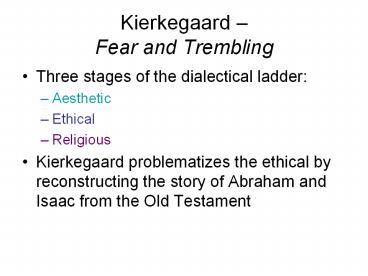Kierkegaard - PowerPoint PPT Presentation
1 / 8
Title:
Kierkegaard
Description:
Kierkegaard Fear and Trembling Three stages of the dialectical ladder: Aesthetic Ethical Religious Kierkegaard problematizes the ethical by reconstructing the ... – PowerPoint PPT presentation
Number of Views:88
Avg rating:3.0/5.0
Title: Kierkegaard
1
Kierkegaard Fear and Trembling
- Three stages of the dialectical ladder
- Aesthetic
- Ethical
- Religious
- Kierkegaard problematizes the ethical by
reconstructing the story of Abraham and Isaac
from the Old Testament
2
Critique of Hegel
- Hegel - truth is universal can be reached only
by using reason and objectivity alone. - importance of surrendering oneself to universal
ethics - subordinating one's own desires to the wishes of
the group the elimination of individuality. - For Hegel and for Kierkegaard, the ethical is
universal - system of behavioral rules must have
general applicability - extends throughout the
community of adherents. - Kierkegaard argues for "suspension" of the
ethical in favor of the religious
3
Critique of Hegel
- Contradiction of Hegel's ideas individuals
perception of a universal ethic could be
(internally to that person) "higher" than the
consensus universal ethic - Therefore that person's ethical actions violate
the universal ethic. - Universal ethic" is an oxymoron - individuality
will always defeat conformity.
4
Kierkegaard Fear and Trembling
- Conflict between the ethical and the religious is
shown in the "teleological suspension of the
ethical" of Abraham's decision to sacrifice his
son in obedience to God's command. - What would be considered murder from an ethical
standpoint is justified as a sacrifice from the a
religious one
5
- Abrahams dilemma raises epistemological
questions - how do we distinguish the voice of
God from a delusional hallucination, e.g.? - Answer, which induces fear and trembling we
cannot know, from a rational standpoint we can
only have faith gt Leap of faith!!!! - Abraham can say nothing to justify his actions
there is no rational justification, and to do so
would return him to the realm of human immanence
and the sphere of ethics.
6
Kierkegaard explores
- difference between Agamemnon, who sacrificed his
daughter Iphigenia, and Abraham - Agamemnon could justify his action in terms of
customary morality (demanded for the sake of the
success of the Greek military mission against
Troy) sacrifices for purposes greater than the
individuals involved, were intelligible to the
society of the time. - Abrahams sacrifice would have served no such
purpose. It was unjustifiable in terms of
prevailing morality, and was indistinguishable
from murder.
7
What does Kierkegaard conclude?
- Abraham showed that one can be forced to
disregard ethics if God commands it, which is the
paradoxical nature of religion. - Faith in the absurd (irrational)
- Individual relationship to and faith in God
supercedes obedience to universally recognized
norms (rationally acceptable) - radical subjectivity relativity no objective
foundation
8
Kierkegaard suggests
- defeat of rationalism and logic (universal
ethics) by - the irrational, the illogical, the emotional, the
spiritual (subjective perception and motivation)































